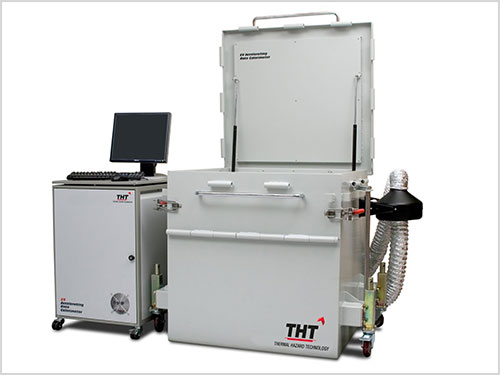EV Accelerating Rate Calorimeter
EV Accelerating Rate Calorimeter
To implement all of the tests with larger batteries, which can be carried out with small batteries using the esARC, THT developed the original EV-ARC in 1999. The EV calorimeter is necessary for larger batteries, modules and small packs, power tools, satellite, military and associated applications. The EV calorimeter is used when variation of heat release over surface area (MultiPoint measurement) is to measured and associated thermal management applications. The EV calorimeter is rugged and is sited in a secure Containment Vessel. Within the containment vessel the standard ARC calorimeter (as in ES-ARC) can be used and this is regularly supplied for "Double Systems". Such a system gives versatility capable of measuring:- small prismatic, coin cell, 18650 and other larger batteries used in power applications. With the EV system all safety tests can be carried out as well as Battery Performance studies.
For More Details..The EV is an cylindrical calorimeter 25cm in diameter and 50cm depth.
Utilises the same electronics and software as the standard esARC, but with a larger calorimeter suitable for testing 18650 to large prismatic cells.
A larger and stronger blast box / containment vessel is supplied with built-in fume extraction.
The size of the containment vessel allows extra space for the incorporation of many options including heat capacity, multipoint option
for spatial temperature measurements, gas collection and controlled speed nail penetration.
Test Services
Sample Testing Service
We offer a full range of battery safety and performance testing on all our ARC systems. Download our flyer.
ARC Safety Testing
Thermal Abuse: Determine the maximum safe operating temperature of the cell and self-heating rate versus cell temperature
Overcharge: Tests can be carried out at different temperature and charge rates.
Short Circuit: Cell is shorted through a low impedance.
Nail Penetration: Automated nail penetration of the cell. Penetration speed, distance and test temperature can be specified.
Temperature Ramp: Establish cell decomposition temperature. Temperature ramp at up to 5°Cmin
ARC Performance Testing
Cell Heat Capacity: Measure from -30°C to maximum cell operating temperature.
Change/Discharge Heat Release: Quantify total thermal energy released from cell/module during different charge/discharge protocols.
Cycling with multiple thermocouple measurement: Establish areas of greatest heat release across the cell surface.
Hardware Features & Performance
EV Calorimeter
25cm diameter; 50cm depth;
20mm thick aluminium, 8 heaters, 6 measuring, control and safety thermocouples
Thermocouple resolution 0.001°C, Precision <0.2%, Accuracy 0.7%
Adiabatic Control to 0.01°C
Collar for large cable ingress
Pre-installed facilities for options
Temperature range
Ambient to 450°C temperature range
(-40°C with liquid nitrogen flow option LNF)
Sensitivity (applicable to new calorimeters only)
0.05°C/min
Potential to achieve 0.02°C/min to 300°C
Pressure
Pressure range 0-200 bar (or specify range to 700 bar with alternative transducers)
Resolution 0.005bar, Precision 0.02%, Accuracy 0.05%
Control Modes
Adiabatic; Ramping, Isothermal modes, True Isothermal, Isoperibolic, Step Isothermal.
Safety
0.57 cubic meter containment vessel (Blast Box);
6mm reinforced Steel, Proximity Switch, Door interlock;
Automated Fume Extraction facility
Sample Holders
Hastelloy, titanium, stainless steel, aluminium, glass, ARC bombs (9cm3), low phi bombs (65cm3) tube bombs (1cm3) special open or closed holders for any battery type.
Customer Support
Installation & training - 1 week, acceptance test
Support
Guarantee 1 year, phone and email support over lifetime of instrument without charge
Part Supply
10 years guaranteed
Manuals
Full operations and data analysis
manuals with tutorials
Software & Computing Power
Control Software
National Instruments Labview based ARC-ES Control Software
Full on-the-fly change of test conditions
Full on-the fly operation
Remote User facilities
Ability to transfer operation on system to any allowed PC over network or internet
Virtual Technician facility
Set up multiple tests in one method
Data Analysis Software
National Instruments Labview based ARCCAL+ analysis software
Features include: Graphical and tabulation of raw data including Phi Corrected TMR plots
Data Conversion to Enthalpy, Power, Gas Generation
Kinetic Modelling for thermodynamic and kinetic data analysis
Phi Correction through kinetic modelling
Report generation in Microsoft Word, Excel, HTML
Analysis of 9 concurrent data sets; 3 analyses on each data set, merge all datasets to a single plot.
Operation / Ambient Environment
Environmental Requirements
Temperature 5-45°C, Humidity 0-95%
Air supply (Optional for rapid cooling post test)
Water (needed only for CSU)
Electrical Specification
Single Phase Electrical Supply 100-250V, 16A 3.5kW
Instrument conforms to CE, UL, VCCI, CSA standards


